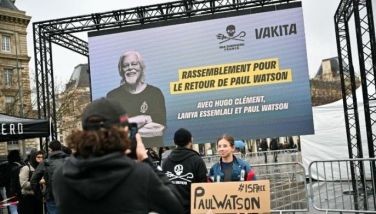What needs to happen before countries lift lockdowns?

PARIS, France — With signs in some countries that the coronavirus pandemic may have reached a plateau, governments are looking at how to lift lockdown restrictions on their crippled businesses and restless populations.
But what are the conditions that countries should meet before they can start safely easing these strict measures and return to some kind of normalcy?
Don't act too quickly
Experts fear that governments will bow to economic and social pressure to lift their lockdowns prematurely, and warn that such a move could allow COVID-19 to return.
"Lifting the restrictions too quickly could lead to a deadly resurgence," World Health Organization chief Tedros Adhanom Ghebreyesus has said.
Christian Brechot, Institut Pasteur president and former head of French national medical research institute INSERM, said we must be "very humble and very careful" with a virus that many nations have already underestimated.
"It's not clear with a pandemic of this scale how everything can miraculously return to normal," Brechot told France Info radio.
European nations begin lifting
Despite such advice, in the hardest-hit continent Europe -- where more than 78,000 people have died from the virus -- several countries have already started partially lifting confinement measures.
Germany, which has seen new cases drop and was already less affected than some of its neighbours, appeared Monday to be moving towards lifting restrictions in stages.
Austria will allow small businesses to reopen after the Easter break, believing it has sufficiently flattened its infection curve.
Denmark will reopen daycare nurseries, kindergartens and primary schools from April 15, while the Czech Republic has already begun to gradually ease restrictions, including opening some shops.
The countries are following in the footsteps of China, which has loosened its unprecedented lockdown on the city of Wuhan, where the coronavirus emerged in December, after the strict measures appeared to have paid off.
'Very high plateau'
Elsewhere in Europe, however, there are fewer signs that restrictions will soon ease.
Britain passed the grim milestone of 10,000 deaths on the weekend while France is expected to extend its lockdown for at least several weeks.
France's national health service director Jerome Salomon said a slight decrease in intensive care admissions was a "pale ray of sunshine," adding that "a very high plateau" seemed to be setting in.
The continent's hardest-hit countries Italy and Spain also seem to have reached such a high plateau, with their daily death rates gradually falling.
But after such a devastating period, neither country is letting down its guard -- Italy has extended its confinement measures until May 3, while Spain has done the same until April 25. Ireland, Portugal and Belgium have also extended their measures.
Gradual relaxation from mid-May?
"It's not when we have arrived at a plateau that we should lift confinement measures which have helped avoid massive congestion in hospitals," said Antoine Flahault, a specialist in public health and epidemiology at the University of Geneva.
It must only happen "when we see a decline," he told broadcaster France 2.
Researcher Brechot said he "hopes that from mid-May we will be in a situation of deceleration" which will allow a "gradual relaxation" of restrictions.
Jean-Francois Delfraissy, who leads the coronavirus science council advising the French government, said "we are not going to go from black to white, but from black to grey, with continued confinement".
"We can start to discuss post-confinement, but the essential and principal factor is to pursue strict confinement for several weeks."
Three conditions
Delfraissy said there were several prerequisites for lifting confinement measures.
First, there would need to be an established decline in the number of COVID-19 cases in intensive care.
This would give exhausted health workers a badly needed respite and allow hospitals to restock equipment and supplies.
The transmission rate of COVID-19 -- the number of people an infected individual infects in turn -- would need to have dropped below one, compared to 3.3 people at the start of the outbreak.
And finally there would need to be a sufficient number of masks to protect the populace and tests to closely monitor the virus's spread.
For example in France, screening capacity would need to increase from the current 30,000 tests a day to 100,000 or even 150,000 a day by the end of April, Delfraissy said.
Unknowns
Of course, these conditions are subject to much uncertainty, including the possible development an app that uses smartphones to trace the contacts of infected people.
Mobile operators have already been providing location data to health researchers in France and Germany.
Another major unknown is the effect that summer has on slowing COVID-19's spread in the northern hemisphere.
Respiratory viruses are generally less prevalent in warmer months -- flu season is in winter -- but will the coronavirus be the same?
"If there is no summer brake, then it will be more complicated" to lift confinement measures, said epidemiologist Flahault.
Follow this page for updates on a mysterious pneumonia outbreak that has struck dozens of people in China.
New Zealand Prime Minister Chris Hipkins says on Sunday that he had contracted COVID-19, testing positive at a key point in his flailing campaign for re-election.
Hipkins saYS on his official social media feed that he would need to isolate for up to five days -- less than two weeks before his country's general election.
The leader of the centre-left Labour Party said he started to experience cold symptoms on Saturday and had cancelled most of his weekend engagements. — AFP
The World Health Organization and US health authorities say Friday they are closely monitoring a new variant of COVID-19, although the potential impact of BA.2.86 is currently unknown.
The WHO classified the new variant as one under surveillance "due to the large number (more than 30) of spike gene mutations it carries", it wrote in a bulletin about the pandemic late Thursday.
So far, the variant has only been detected in Israel, Denmark and the United States. — AFP
The World Health Organization says on Friday that the number of new COVID-19 cases reported worldwide rose by 80% in the last month, days after designating a new "variant of interest".
The WHO declared in May that Covid is no longer a global health emergency, but has warned that the virus will continue to circulate and mutate, causing occasional spikes in infections, hospitalisations and deaths.
In its weekly update, the UN agency said that nations reported nearly 1.5 million new cases from July 10 to August 6, an 80% increase compared to the previous 28 days. — AFP
The head of US intelligence says that there was no evidence that the COVID-19 virus was created in the Chinese government's Wuhan research lab.
In a declassified report, the Office of the Director of National Intelligence (ODNI) says they had no information backing recent claims that three scientists at the lab were some of the very first infected with COVID-19 and may have created the virus themselves.
Drawing on intelligence collected by various member agencies of the US intelligence community (IC), the ODNI report says some scientists at the Wuhan lab had done genetic engineering of coronaviruses similar to COVID-19. — AFP
Boris Johnson deliberately misled MPs over Covid lockdown-breaking parties in Downing Street when he was prime minister, a UK parliament committee ruled on Thursday.
The cross-party Privileges Committee said Johnson, 58, would have been suspended as an MP for 90 days for "repeated contempts (of parliament) and for seeking to undermine the parliamentary process".
But he avoided any formal sanction by his peers in the House of Commons by resigning as an MP last week.
In his resignation statement last Friday, Johnson pre-empted publication of the committee's conclusions, claiming a political stitch-up, even though the body has a majority from his own party.
He was unrepentant again on Thursday, accusing the committee of being "anti-democratic... to bring about what is intended to be the final knife-thrust in a protracted political assassination".
Calling it "beneath contempt", he said it was "for the people of this to decide who sits in parliament, not Harriet Harman", the veteran opposition Labour MP who chaired the seven-person committee. — AFP
- Latest
- Trending


































